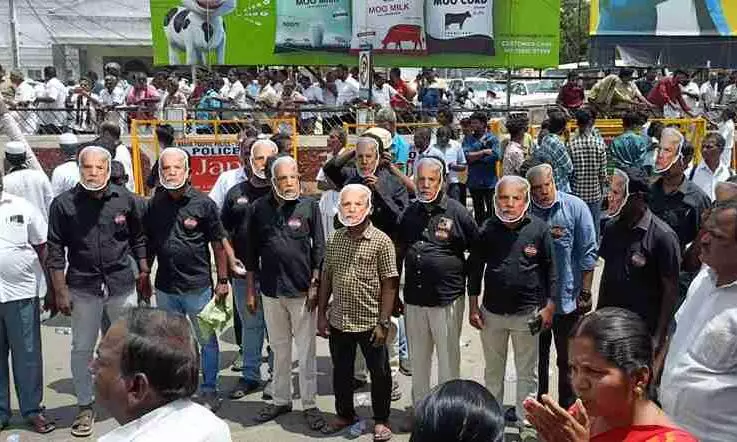
Modi asked US to impose 50 pc tariff: DMK’s A Raja at Tiruppur protest
A Raja alleges that PM Modi was complicit in the US’s 50 pc tariff, an ‘economic war’ against India; textile exporters warn of severe industry impact

Dravida Munnetra Kazhagam (DMK) MP A Raja on Wednesday (September 3) accused the BJP government of complicity in the 50 per cent tariff imposition by the United States, saying it “wasn’t just [US President Donald] Trump’s decision; it was Modi who allowed it”.
Raja’s curious allegation came at a massive protest rally held by the DMK-led Secular Progressive Alliance (SPA) near Tiruppur Railway Station on Wednesday, condemning the BJP-led Union government for its failure to address the severe impact of the US tariffs on Indian exports, particularly affecting Tiruppur’s knitwear industry.
All coalition partners, including the Congress, the Viduthalai Chiruthaigal Katchi (VCK), the Marumalarchi Dravida Munnetra Kazhagam (MDMK), the Communist Party of India (CPI), the Communist Party of India (Marxist) (CPM), and the Makkal Needhi Maiam (MNM), participated in the protest. Prominent leaders such as MDMK’s Vaiko and VCK’s Thol. Thirumavalavan delivered key addresses.
Also read: What will Modi do for TN’s textile hubs hit by US tariffs? DMK asks
A Raja’s claim
A Raja, in a fiery speech, accused the BJP government of being complicit in the tariff imposition. “The United States has imposed 50 per cent tariff to cripple Indian industries. It wasn’t just Trump’s decision; it was Modi who allowed it. This is not an ordinary tax—it’s an economic war against our nation,” he thundered.
Raja further criticized the Modi government’s foreign policy, referencing External Affairs Minister S Jaishankar’s parliamentary statement that the US had warned India about a potential Pakistani attack. “Why do we only wake up only after the US alerts us about Pakistan’s plans,” he questioned.
Raja also highlighted Trump’s claim of halting an India-Pakistan conflict, noting, “Modi has not clarified whether Trump’s statement is true or false. Modi and [Union Home Minister] Amit Shah have sold India, while [Mukesh] Ambani and [Gautam] Adani have bought it. This tariff is an extension of that betrayal,” he claimed.
Also read: Trump claims US is so powerful 'everything in the world would die' without it
Support from textile industry
The protest garnered support from Tiruppur’s textile industry stakeholders. N Thirukkumaran, General Secretary of the Tiruppur Exporters Association, emphasized the sector’s economic significance, stating, “Tiruppur exports Rs 45,000 crore annually, accounting for 65 per cent of India’s knitwear exports, with Rs 15,000 crore directed to the US alone. US buyers are demanding up to 30 per cent discounts, threatening to halt orders if their demand is unmet, severely impacting industries and workers.”
He urged the Union government to take immediate action to mitigate the crisis.
CPI(M) MP Su. Venkatesan added, “This tariff disproportionately affects Tamil Nadu, a state that has risen through hard work. Modi fears both Trump and Tamil Nadu. We must strike back decisively.”
Also read: Ro Khanna says Trump imposed tariffs on India after Modi's Nobel snub
Foreign policy into local politics
Senior journalist Savitri Kannan commented on the political implications, noting, “The DMK-led coalition is strategically turning the US tariff issue against the BJP, transforming a foreign policy matter into local politics. It remains unclear how the BJP will counter this in Tamil Nadu, but this is a shrewd political move by the DMK.”
The protest underscored the economic threat to Tiruppur’s textile hub, with exports worth nearly Rs 3,000 crore at risk and lakhs of jobs on the line. The DMK-led ally demanded urgent relief measures, including tax concessions, subsidies, and diplomatic negotiations with the US to protect the industry.

